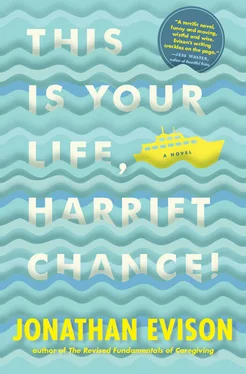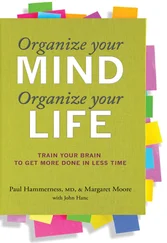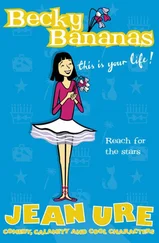Maybe the fall jarred something, you tell yourself. Maybe he’ll snap out of this coma and miraculously remember everything, and the two of you can go back to your contentious Scrabble matches, your early dinners, and the stultifying routine that marked your days before Bernard began losing his mind.
Even if he didn’t remember you, that wouldn’t be so bad.
Even if he returned to Sherwood Arms, and you made your daily visits and baked him lemon ginger scones, that would be okay. Even if he just lay here like this, insensate, maybe twitching an eyebrow now and again, wiggling a toe, as you read the history of the Civil War to him or combed his hair and trimmed his fingernails, that wouldn’t be the worst thing in the world.
No, this is the worst thing in the world: reality. Trumper of hope, killer of faith. The reality that there’s no going back, that once those monitors stop beeping, the only man you’ve ever loved will never again hold your hand or touch your shoulder or berate you for a dripping faucet.
When Skip and Caroline leave the room, you stand there stupidly, all alone in the chill hospital air, not knowing what to do or say as the life support ceases functioning.
“I’m sorry it ended badly,” you say.
He’s already dead, you tell yourself. There is little significance to this moment. But something happens, doesn’t it, Harriet? As you watch his chest rise and fall for the last time, watch his ribs contract with the tiniest of paroxysms, you actually feel him take leave, not of his own body but of yours, like a shiver running from the base of your neck out the top of your head.
Only then do you realize that all these years he lived inside of you.
August 24, 2015 (HARRIET AT SEVENTY-EIGHT)
Caroline’s been gone less than two minutes when Harriet feels a familiar presence beside her in bed: Bernard.
“I’ve been thinking,” he says from behind the cover of his newspaper. “Maybe cut Skipper a little slack,” he says. “He’s desperate, you know.”
“That’s what Caroline says.”
“She’d know.”
“But selling my house from under me, locking me away in a nursing home? And not even having the courage to do it himself. What really gets me is he could have just asked for help.”
Bernard lowers his newspaper, his eyes scanning the room nervously. “We all could have. The point is, Skip’s on the ropes. Hell, half of America is. He’s not in his right mind, at least he wasn’t when he hatched this ridiculous plot. It’s amazing the things we can talk ourselves into when we’re desperate for a result. And really, maybe it’s not such a bad plan, after all. You’re gonna break your neck on those basement stairs one of these days if you’re not careful. You can’t possibly handle that big yard by yourself.”
“I chose that house. And I choose it still.”
“Whatever you say. I’m running out of time here. We both are, Harriet. You forgave Caroline. Now forgive Skip. Go easy on him.”
“I went pretty easy on you, didn’t I?”
“You did, yes. And forgive yourself while you’re at it. That’s the biggest one of all.”
They retreat into silence. After a moment, Bernard peels the covers back, rolls up his newspaper like a baton, taps it decisively once upon his lap, and climbs out of bed.
“Well, I think this is it, Harriet.”
“You’re leaving?”
“I have to. No time to explain, but I haven’t got a choice.”
“What will happen to me?”
“I can’t tell you that.”
“Can’t or won’t?”
Standing now, he looks down on her sympathetically. “Amounts to the same thing. I’m sorry I made a mess of us. Of everything, really. I could have been more, a lot more.”
“What will happen to you?”
“Nothing.”
God, but Harriet wants to reach out and touch him one last time, to grab hold of him and never let go. But she’s stuck in place, unable to budge, held there in bed by some invisible force akin to gravity.
“What are you?” she says. “You owe me that much. A ghost, an angel, a dream?”
Crow’s-feet bunch at the corners of his eyes. “It’s not for me to say.”
There’s something timeless etched beneath their gray-green veneer, some truth or recognition regarding the nature of existence, some celestial reckoning, Harriet is sure of it. But hard as she tries to apprehend it, it is simply beyond her reach.
Bernard backs away from the bed slowly, a sheepish smile on his face. “Well, here goes nothing,” he says.
In that instant, the key latch clicks and the cabin door swings open.
Still backing away, Bernard blows her a kiss.
“Don’t go,” she says.
“Mom?” says Caroline, from the doorway. “What’s up? You’re doing it again.”
“No, no, dear. Just thinking aloud.”
When Harriet turns back to Bernard, he’s gone, disappeared into thin air.
Caroline stoops to pick Bernard’s rolled-up newspaper off of the floor, tossing it absently on the coffee table. “Maybe Ketchikan is too much, Mom. Maybe we should just stay aboard tomorrow, watch some movies, order room service.”
“Heavens, no,” says Harriet. “I wouldn’t hear of it. It’s our last stop, dear.”
July 4, 1938 (HARRIET AT ONE)
My, but how we’ve grown, Harriet! To think, from a scrawny six pounds and change, we’re now officially off the charts at twenty months. Our neck disappeared at three months. Our arms and legs ballooned. When we smile, we have more chins than teeth.
Everybody expected us to start thinning out after our first birthday, once we started walking. But we still look as though we’ve got rubber bands around our wrists and ankles. Our mother calls us “Little Piggy” even as she foists another formula bottle full of powdered milk and Karo syrup on us. She may as well be injecting it into our thighs. We yearn for real food, but for reasons we will never understand, our mother forever pushes the bottle on us.
Our father adores us, every ounce. Not without pride, he characterizes us as his “little bruiser.”
Ample. Substantial. Tubby. All words used to describe our one-and-a-half-year-old personage. Quiet, of course, is another.
No, we’ve still yet to utter a sound, Harriet, beyond the occasional yelp, sniffle, or burp. What are we waiting for? Nobody’s expecting sentences, Little Piggy. A few grunts would suffice, even some crying would be a welcome development. While nobody can fault us for our stoicism, they’d like to know that we’re at least capable of utterance.
Speak, Harriet, it’s in your best interest!
A simple “Help!” might have come in handy on that fateful Fourth of July 1938 as friends and family of Nathan, Montgomery, Ferris, and Fitzsimmons gather to celebrate American independence.
Look at us, Harriet, squatting beneath a picnic table at Volunteer Park, staring at our mother’s swollen ankles, inhaling the blue smoke of the barbecue, and listening to the muffled laughter of other children as a greedy bite of frankfurter, scavenged from beneath the table, lodges itself in our esophagus.
Silently, we panic as our eyes bulge from their sockets.
Quietly we gasp for dear life as the inky black ghosts crowd our vision. This is it, Harriet. Say something! Speak, child!
Okay, the truth is, we couldn’t have made a sound if we wanted to, not with that hot dog wedged in our gullet.
Consider us lucky, Harriet.
Our frantic kicks alert the second-nearest adult, who finding us bug-eyed and blue at his feet, pulls us out, and promptly executes his version of the Heimlich maneuver. In dislodging the offending sausage, he inadvertently breaks two of our ribs, a fact that will not be discovered until late the following afternoon when the bruising becomes impossible to ignore.
Читать дальше












